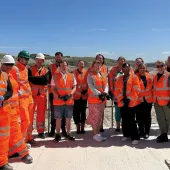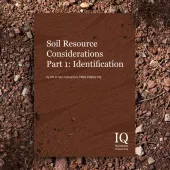Institute of Quarrying Quarry Question Time

Institute of Quarrying’s Derbyshire branch hosts 5th annual James Cuthbert Memorial Quarry Question Time
The Institute of Quarrying’s annual James Cuthbert Memorial Quarry Question Time, now in its fifth year, took place on Thursday 28 February in the Court Room at the University of Derby’s Kedleston Road site. Once again, the event was well attended by Institute members and industry stakeholders, along with students and lecturers from the University.
Emma Travis, Derbyshire branch chairman, opened the event and thanked the distinguished panel members for giving up their time to participate in the debate. The theme this year was ‘People: The industry’s most important resource?’ The panel, introduced and chaired by Peter Huxtable, secretary of the British Aggregates Association, comprised: Roy Bush, HM Inspector of Quarries; Heather Wheeler, MP for South Derbyshire; Peter Barkwill, chairman of the Institute of Quarrying and managing director of John Wainwright & Co.; Clare Mayo, human resources director with Hanson UK; and Colin Jenkins, President of the Institute of Quarrying.
The first question put to the panel was: ‘During a period where rationalization is the name of the game, do we feel that the industry truly values its people as its greatest asset?’
In response, Clare Mayo said yes, there are lots of good people who do an excellent job. However, due to the difficult economic times and the lack of market demand, businesses have no choice but to ‘right size’. She acknowledged that this was tough and felt that it would probably take 10 years of slow-paced recovery to get back to the pre-recession market conditions.
Colin Jenkins responded to the contrary, as he felt that people are not necessarily the best asset of a company. He recognized that quarrying is a people industry with many generations of families working in quarries; however, he felt that good relationships need to be maintained with all people involved with the industry, including customers and stakeholders. He also commented that companies would always try to look after their employees.
Heather Wheeler made reference to her constituency having a large aggregates industry and a crushing equipment manufacturer within it. She also commented that 70,000 people are employed in the aggregates industry and that housing, schools and universities, roads, rail infrastructure, and energy production all need those 70,000 people to produce. As a consequence, she felt that people are the most important asset.
Peter Huxtable mentioned, as a reminder to government, that every £1 spent on construction generates around £3 of economic growth.
Peter Barkwill responded to the question from the aspect of failure – how do you measure failure? In his view, people are, by a long way, the most important asset of a company. Businesses do not fail due to lack of investment in people; however, to survive in difficult economic times the best people are needed. In his experience, if employees buy into the ideas and brand of a company, and the company lets them know that they are important, appreciated and needed, then they will help that company to succeed.
Roy Bush also agreed that companies should value employees as their most important asset. He stated that workforce involvement is key for safe working and good team work, as a result of which companies will also be more efficient.
Question 2: ‘There is concern that the industry is not doing enough to stem the loss of expertise, particularly as the recession may continue for some years. With current staff levels, will the industry have both apprentices and experienced people available when the recession lifts?’
Clare Mayo commented that even though cost-reduction plans are being progressed, it is recognized that there is still the need to take on apprentices due to an aging workforce and shortage of quarry managers. She stated that Hanson are keen to work with the University of Derby and continue to take on electrical and mechanical engineering apprentices within their cement division.
Peter Barkwill mentioned that his own company has educational links with young students through its Earth Science Centre. He quipped that ‘if you want your company to prosper and grow, then surround yourself with clever people’. He agreed that apprenticeships should be maintained and was not overly concerned about recruiting for the future. He did feel, however, that there is a need to ‘talk up’ the minerals industry and make it ‘sexy’. His view is that if you have a good brand and a well-run company, people will want to join it.
Heather Wheeler talked about the very localized aspects of the industry, distinguishing between alluvial sand and gravels in the south of Derbyshire and hard rock in the north. She made the point that this very traditional industry has had to change so much. She also talked passionately about apprenticeships and referred to Toyota having an ‘apprentice block’ on site, with the company investing a lot in apprenticeships and even feeding the skilled people that they develop into the supply chain.
Colin Jenkins discussed a ‘fully competent workforce’ and the training and development required to support this. He felt that the University of Derby Diploma is a very worthwhile qualification which makes recipients of the award marketable for employment and development within the industry. The diploma, he said, is a ‘differentiator’ that makes recipients ‘stand out from the crowd’.
Roy Bush continued the discussion around a fully competent workforce. Even though the target to achieve a fully competent workforce had not been met first time round, at least the industry itself had set the targets, and had regrouped and was now pushing on again with readjusted targets.
Question 3: ‘Does the panel agree that rationalization risks increasing staff stress levels and what can be done to deal with the stress from which many managers are suffering?’
Roy Bush commented that the Quarries National Joint Advisory Committee recognizes stress in the industry. He mentioned that there is a good stress- management tool available on the HSE website, which gives good advice on this problem.
Clare Mayo talked about an Employee Assistance Programme which Hanson and other companies operate. Councillors can be contacted 24h a day to discuss any issues, including work-related stress. She also mentioned the importance of training people to be able to recognize the symptoms of stress and dealing with issues promptly.
Heather Wheeler stated that it was not the role of the Government to interfere in managing businesses. A company is responsible for its employees and should do all it can to manage situations relating to stress.
Colin Jenkins pointed out that dealing with downsizing and quarry mothballing is a very stressful situation in itself. A good company will manage these situations correctly, openly and offer support to employees. He encouraged companies to have an open-door policy when dealing with stress.
Peter Barkwill commented that the industry had clearly gone through a torrid time and suffered a lot of pain because the market is not there. He acknowledged that there is a need to cut costs; however, care must be taken not to just ‘cut, cut and cut’. He agreed that senior managers and quarry managers are under huge pressure and hold huge responsibility in looking after people’s lives. His view is that employing additional staff, to take some pressure off the few, could actually reap real benefits.
Roy Bush acknowledged that companies do have to take decisions about making people redundant. He mentioned that employee forums must be trustworthy and he recognized that the uptake in using employee-assistance programmes is low. It is a delicate matter and it takes a lot of time to build the required trust.
Peter Huxtable commented that an alternative to redundancies that has been used by some companies is reducing pay by between 15% and 20%. He felt that some companies might look at that sort of approach to help save jobs.
Question 4: ‘Are employees of major multinational companies treated more favourably than those of SMEs with regard to salaries, training, tenure etc?’
Peter Barkwill responded with an emphatic ‘No’. He felt that employees are far better looked after and appreciated working for his own company. Wainwright have looked at what the big multinationals do and adopted their good practices. He also felt that a lot depends on the size of an SME in relation to the terms and conditions offered. His own company is surrounded by the big players and yet he feels that Wainwright can compete head to head. His view is that having the right employment packages, engaging with employees and making them realize that they can and do make a difference, goes a long way to achieving success.
Colin Jenkins talked about his experiences working in both environments and could not say which he felt treated employees more generously. His view is that there are good and bad in both large organizations and SMEs.
Roy Bush agreed that there are good and bad examples to be found in both large and small companies. He felt that salary is not the chief motivator for people and that there are many more aspects to whether a company values its staff.
Clare Mayo felt that good SMEs could be more favourable as they do not have to be so rigidly structured, but large companies can probably offer better career paths, prospects and opportunities. In general, however, she did not feel that large multinationals treat employees better.
Heather Wheeler felt that it was down to individual companies. Ninety percent of firms in her constituency employ fewer that 15 people. She talked about important packages that are available to small companies, such as ‘Mentorsme’ and ‘Growth Accelerator’, to help them develop and be successful in the marketplace. Heather also mentioned that there are start-up schemes and financial investment packages available to small businesses, plus UK Trade and Industry road shows to help with developing export opportunities.
Question 5: ‘What can be done to give the minerals industry greater added value so that staff may be paid appropriately?’
Clare Mayo held the view that the setting of pay levels should be done through a grading mechanism such as Hay or Mercer. These would determine the skills, knowledge, financial responsibilities etc of different job roles and benchmark accordingly. Clare felt that there were no issues with these types of grading systems.
Peter Barkwill did not believe there was much of a problem and that, from his experience, there are no current problems with recruiting. He believes that the industry pays reasonably well and holds the view that a potential shortage in future skills could drive up salaries.
Colin Jenkins responded with the phrase ‘Horses for courses’. In his view, people ‰ move around quite a lot within the industry and are paid in respect of the job role being undertaken and required skill levels. He also commented that it is about far more that just a salary package; there are far more opportunities for people working in the minerals industry, a lot of intangibles, variety within job roles, and a great working environment.
Roy Bush felt that it was not appropriate to comment on this question from an HSE perspective. The HSE itself has not recruited for a couple of years and there has been a freeze on salaries. However, he did say that it was about balancing working long hours with working in beautiful parts of the countryside on a sunny day. He also stated that it is the prevailing market conditions which, ultimately, determine salary levels.
Peter Huxtable mentioned that there are similar problems with attracting people into mineral planning roles due to low salaries.
Heather Wheeler felt that regulation and red tape are not helping with the control of costs in the industry. She cited the aggregates levy and carbon floor price as examples of additional financial burden. Her view was that more money needs to be kept in the business by deregulation.
Question 6: ‘As approximately 80% of mineral production in this country is in the control of multinational companies, do they understand the need for training and staff development?’
Clare Mayo reminded the audience of the MPA target to have a fully competent workforce by 2017 through NVQs and QCFs. She felt that training was available to underpin qualifications, and she expected the training budgets for all the major companies to increase. She also commented that Hanson’s training budget had remained the same despite a reducing headcount within the business.
Peter Barkwill stated that the industry is very different today. He felt that quarry managers have to deal with multi-complex issues, complex business models and changing information technology. His view is that skill sets need to be increased to meet the demands of today in comparison with just 20 years ago. Clearly, competence is crucial and critical due to the hazards within the industry. In terms of personal development for employees, he feels that the major companies have been very responsible and taken the lead.
Colin Jenkins holds the view that cement engineers have a better understanding of operating and running quarries, although a lot depends on who the owners are. He feels that trade bodies have helped the industry considerably with training and development. His view is that you can never finish optimizing your operations and that it is more about focusing on training and development.
Roy Bush stated that efficiencies are driven by the competency of the people working for the business. His view is that a good, efficient business will also be a profitable and safe business.
Heather Wheeler acknowledged that she does not know the quarrying business but felt that the minerals industry could learn a lot from the way companies such as Toyota and Rolls Royce take on apprentices to train and develop. Rolls Royce, for example, are taking on 200 apprentices and, as a result, expect to gain 108 high-calibre people for the future.
Question 7: ‘With low numbers of staff, do we feel we can still continue to maintain the industry’s improved health and safety record?’
Colin Jenkins said there was absolutely no reason why not, especially with fewer operations and lower numbers of more competent people employed. He acknowledged, however, that the recycled aggregates sector needed to do more to improve its health and safety performance to the same levels as the quarrying industry in general.
Roy Bush commented that the industry should be recognized for the dramatic reduction in accidents over the last 10 years. No other industry has achieved comparable results. He said the target ‘Zero Harm’ initiative is to be applauded, although accidents have not reduced as much over the last three years. His view is that it will require the involvement of everyone in safety discussions, not just safety committees and inspections, with true visible and felt leadership, listening to suggestions and involving all people in improving standards.
Peter Barkwill agreed fully with Roy’s comments. His own view is that workforce involvement is critical. In today’s market, a safe, well-managed company will receive accolades. He acknowledged that the major companies hold safety as their number one priority and agreed with their claims. However, he stated that he has some concerns that rationalization programmes may be cutting back a bit too far.
Clare Mayo agreed with all the previous comments made by panel members. She mentioned that a number of Hanson’s sites had had no accidents for several years. She recognized that there is still a lot of work to do and that employees are now looking at ways to eliminate risk rather than manage it.
Heather Wheeler mentioned that her father had started the Health and Safety Executive and that the answer that Roy had given to this question was probably the best that she had heard from a HSE member.
Upon conclusion of the questions and responses outlined above, the evening was summarized by Colin Jenkins, who commented that the next 10 years could, perhaps, be a decade for SMEs. Thanks were given to the individual panel members for their contributions, and to the University of Derby for hosting the event. The uniqueness of the event was also highlighted, this being the only Quarry Question Time event in the UK.
This special IQ report was compiled by Keith Rowland, Derbyshire branch correspondent.








